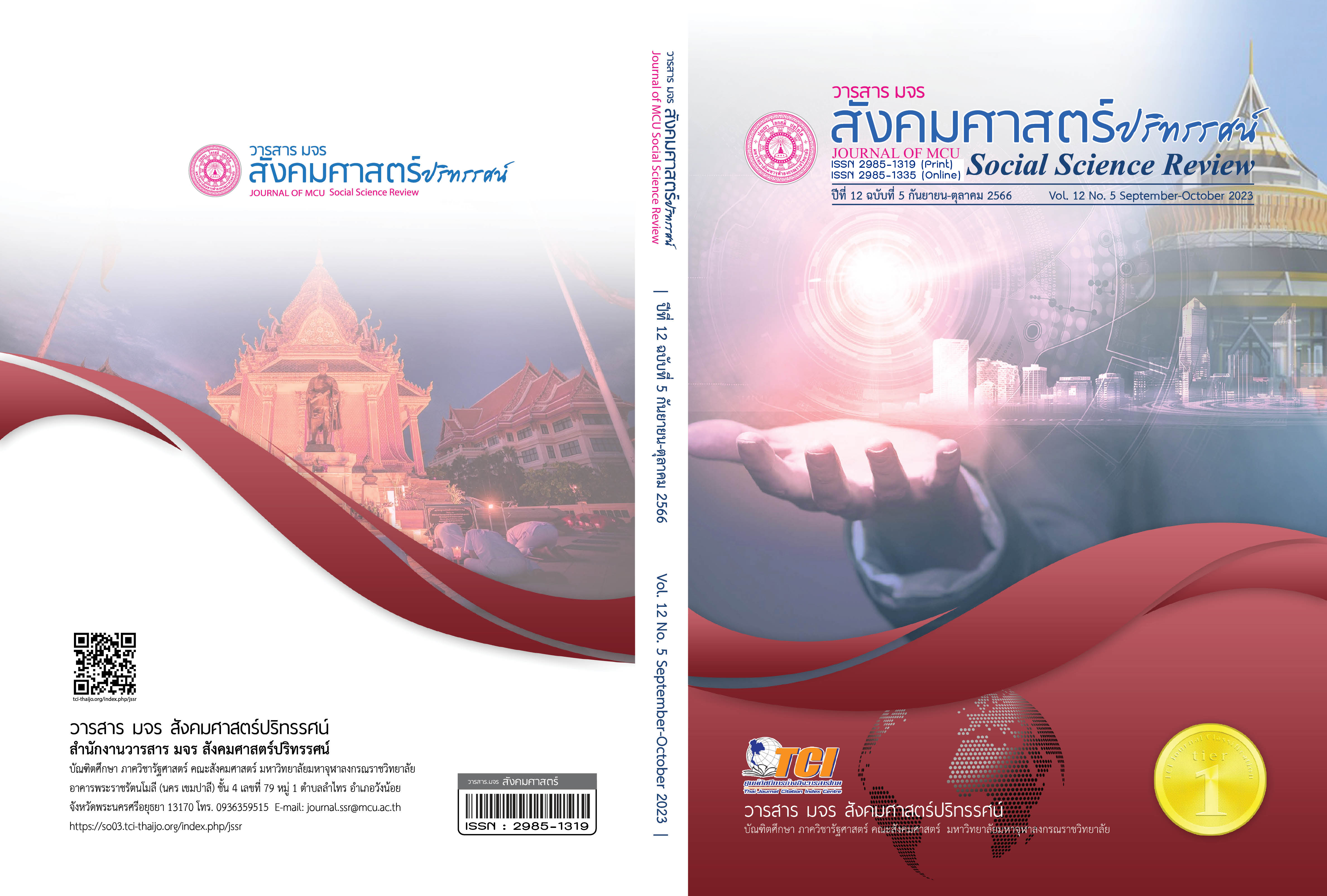การจัดการความรู้เพื่อพัฒนาห่วงโซ่คุณค่าทางการท่องเที่ยว ของจังหวัดนครนายก
คำสำคัญ:
การจัดการความรู้, ห่วงโซ่คุณค่าทางการท่องเที่ยว, จังหวัดนครนายกบทคัดย่อ
บทความวิจัยนี้มีวัตถุประสงค์เพื่อ 1. วิเคราะห์สถานการณ์การท่องเที่ยวของจังหวัดนครนายกในปัจจุบัน 2. สำรวจกิจกรรมห่วงโซ่คุณค่าทางการท่องเที่ยว 3. ศึกษากระบวนการจัดการความรู้เพื่อพัฒนาห่วงโซ่คุณค่าทางการท่องเที่ยว และ 4. เสนอรูปแบบการจัดการความรู้เพื่อพัฒนาห่วงโซ่คุณค่าทางการท่องเที่ยวของจังหวัดนครนายก โดยใช้การวิจัยเชิงคุณภาพ เก็บข้อมูลโดยการสัมภาษณ์และประชุมกลุ่มย่อยผู้ให้ข้อมูลสำคัญ ได้แก่ ผู้นำชุมชน ผู้ประกอบการธุรกิจท่องเที่ยว และบุคลากรจากภาครัฐ จำนวน 20 คน วิเคราะห์ข้อมูลโดยใช้การวิเคราะห์เนื้อหา
ผลการวิจัยพบว่า 1. จังหวัดนครนายกมีศักยภาพทางการท่องเที่ยวทางธรรมชาติ วัฒนธรรม และสิ่งที่มนุษย์สร้างขึ้น จุดอ่อนและอุปสรรค ได้แก่ การจัดการแหล่งท่องเที่ยวและการประชาสัมพันธ์ขาดความต่อเนื่อง ข้อจำกัดด้านกฎหมายเกี่ยวกับแหล่งท่องเที่ยว และสถานการณ์โรคโควิด-19 2. กิจกรรมห่วงโซ่คุณค่าทางการท่องเที่ยวเป็นกิจกรรมในการสร้างคุณค่าและพัฒนาผลิตภัณฑ์ ได้แก่ สิ่งดึงดูดใจ การเข้าถึง ที่พัก กิจกรรม และสิ่งอำนวยความสะดวก 3. กระบวนการจัดการความรู้เพื่อพัฒนาห่วงโซ่คุณค่า ประกอบด้วย การบ่งชี้ความรู้ การสร้างความรู้ การจัดความรู้ให้เป็นระบบ การประมวลความรู้ การเข้าถึงความรู้ การแบ่งปันความรู้ และการเรียนรู้ ครอบคลุมองค์ประกอบแหล่งท่องเที่ยว และ 4. รูปแบบการจัดการความรู้เพื่อพัฒนาห่วงโซ่คุณค่าทางการท่องเที่ยว ประกอบด้วย 1) วิสัยทัศน์การจัดการความรู้ 2) กระบวนการจัดการความรู้ และ 3) ห่วงโซ่คุณค่าทางการท่องเที่ยว
เอกสารอ้างอิง
กระทรวงการท่องเที่ยวและกีฬา. (2564). สถิตินักท่องเที่ยว. สืบค้น 13 เมษายน 2564, จาก https://www.mots.go.th/more_news_new.php?cid=411
ชมรมส่งเสริมการท่องเที่ยวโดยชุมชนไทยพวน จังหวัดนครนายก. (2562). ไปกะเลอดี. สืบค้น 1 มิถุนายน 2562, จาก https://www.thaipuantour.com
ชัชวาล วงศ์ประเสริฐ. (2548). การจัดการความรู้ในองค์กรธุรกิจ. กรุงเทพฯ: เอ็กซเปอร์เน็ท.
ชัยนุวัฒน์ ปูนคำปีน. (2555). การท่องเที่ยวโดยชุมชน : การสร้าง ขยายเศรษฐกิจและวิถีชีวิต ท้องถิ่น. สืบค้น 30 พฤษภาคม 2562, จาก http://www.bangkokbiznews.com
ญาลิสาฐ์ ต้นสอน. (2559). แนวทางการพัฒนาโซ่คุณค่าเพื่อเพิ่มศักยภาพการบริหารจัดการของการบริษัทนำเที่ยวของไทยเพื่อรองรับการเปิดเสรีทางการค้าตามกรอบความร่วมมือของอาเซียน. BU ACADEMIC REVIEW, 15(1), 86-100.
เทิดชาย ช่วยบำรุง. (2552). บทบาทขององค์กรปกครองส่วนท้องถิ่นกับการพัฒนาการท่องเที่ยวอย่างยั่งยืนบนฐานแนวคิดเศรษฐกิจพอเพียง. กรุงเทพฯ: สถาบันพระปกเกล้า.
บูรณศักดิ์ มาดหมาย. (2553). ระบบการผลิตแบบลีน (Lean Production) ในการจัดการซัพพลายเชน. อินดัสเทรียล เทคโนโลยี รีวิว (Industrial technology review), 16(202), 111-116.
วัลย์ลดา วิวัฒน์พนชาติ และคณะ. (2550). อุปทานแรงงานสำหรับกิจกรรมการท่องเที่ยวทางธรรมชาติอย่างยั่งยืนบนพื้นที่เกาะช้าง กิ่งอำเภอ เกาะช้าง จังหวัดตราด. กรุงเทพฯ: มหาวิทยาลัยรามคำแหง.
วิจารณ์ พาณิช. (2549). การจัดการความรู้คืออะไร : ไม่ทำ ไม่รู้. สืบค้น 13 เมษายน 2564, จาก http://www.sciplanet.org/download/kmDoc/what_is_KM.doc
สภาพัฒนาการเมืองจังหวัดนครนายก. (2562). ประวัติความเป็นมาของจังหวัดนครนายก. สืบค้น 30 พฤษภาคม 2562, จาก https://www.sites.google.com/site
สำนักงานคณะกรรมการพัฒนาระบบราชการ. (2548). การจัดการความรู้ (พิมพ์ครั้งที่ 3). กรุงเทพฯ: สำนักงานคณะกรรมการพัฒนาระบบราชการ.
กลุ่มงานยุทธศาสตร์และข้อมูลเพื่อพัฒนาจังหวัด. (2563). แผนพัฒนาจังหวัดนครนายก พ.ศ. 2561-2565 (ฉบับทบทวน). นครนายก: สำนักงานจังหวัดนครนายก.
สำนักงานพัฒนาชุมชนจังหวัดนครนายก. (2562). ชุมชนท่องเที่ยว OTOP นวัตวิถีต้นแบบ จังหวัดนครนายก. สืบค้น 30 พฤษภาคม 2562, จาก www.tcotopnawat.com
อมราวดี คำบุญ และดลฤทัย โกวรรธนะกุล. (2556). การประเมินความพร้อมทางการท่องเที่ยวของเมืองท่องเที่ยวขนาดเล็กอำเภอเขมราฐ จังหวัดอุบลราชธานี. วารสารการบริการและการท่องเที่ยวไทย, 8(2), 3-22.
Ivolga, A. & Erokhin, V. (2013). Tourism as an approach to sustainable rural development: case study of Southern Russia. Retrieved December 31, 2021, from http://www. researchgate.net/publication/295938932
Netherlands Development Organization. (2010). Value Chain Development for Tourism Destinations. Retrieved March 28, 2021, from http://www.hitt- initiative.org/wp/wp-content/uploads/2011/11/GHTDP-VCD
Porter, M. E. (1985). The Competitive Advantage: Creating and Sustaining Superior Performance. New York: Free Press.
ดาวน์โหลด
เผยแพร่แล้ว
รูปแบบการอ้างอิง
ฉบับ
ประเภทบทความ
สัญญาอนุญาต
ลิขสิทธิ์ (c) 2023 วารสาร มจร สังคมศาสตร์ปริทรรศน์

อนุญาตภายใต้เงื่อนไข Creative Commons Attribution-NonCommercial-NoDerivatives 4.0 International License.
เพื่อให้เป็นไปตามกฎหมายลิขสิทธิ์ ผู้นิพนธ์ทุกท่านต้องลงลายมือชื่อในแบบฟอร์มใบมอบลิขสิทธิ์บทความให้แก่วารสารฯ พร้อมกับบทความต้นฉบับที่ได้แก้ไขครั้งสุดท้าย นอกจากนี้ ผู้นิพนธ์ทุกท่านต้องยืนยันว่าบทความต้นฉบับที่ส่งมาตีพิมพ์นั้น ได้ส่งมาตีพิมพ์เฉพาะในวารสาร มจร สังคมศาสตร์ปริทรรศน์ เพียงแห่งเดียวเท่านั้น หากมีการใช้ภาพหรือตารางหรือเนื้อหาอื่นๆ ของผู้นิพนธ์อื่นที่ปรากฏในสิ่งตีพิมพ์อื่นมาแล้ว ผู้นิพนธ์ต้องขออนุญาตเจ้าของลิขสิทธิ์ก่อน พร้อมทั้งแสดงหนังสือที่ได้รับการยินยอมต่อบรรณาธิการ ก่อนที่บทความจะได้รับการตีพิมพ์ หากไม่เป็นไปตามข้อกำหนดเบื้องต้น ทางวารสารจะถอดบทความของท่านออกโดยไม่มีข้อยกเว้นใดๆ ทั้งสิ้น





